![]()
|
Henry
M Williamson & Sons |
|
Location and period of operation:
|
H M Williamson & Co |
Longton |
1858 |
1872 |
|
H M Williamson & Son |
Longton |
1872 |
1879 |
|
H M
Williamson & Sons |
Longton |
1879 |
c.1947 |
Bone
china manufacturers at
the Bridge Pottery Works, Longton,
Stoke-on-Trent, England
|
NOTE: There was an earlier
pottery company 'Heathcote & Co'
- there was no connection with Williamson & Sons
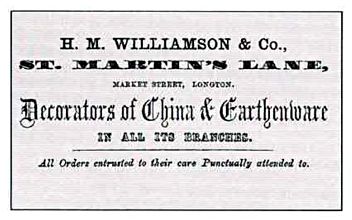 H. M. Williamson & Co., St. Martin's Lane Market Street, Longton Decorators of China & Earthenware in all its Branches All Orders entrusted to their care Punctually attended to. this advert appeared in the 1865 Keates directory |
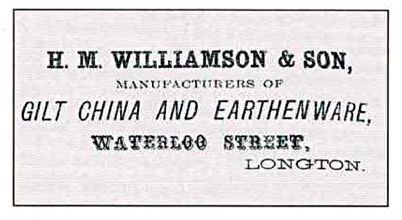 H. M. Williamson & Son, Manufacturers of Gilt China and Earthenware Waterloo Street, Longton this advert appeared in the 1873 |
 notice of the dissolution of the partnership between Henry Mountford Williamson, Enoch Turner and Samuel Bridgwood This notice appeared in the Longton
Gazette of |
adverts courtesy: Dick Henrywood, p248 |
||
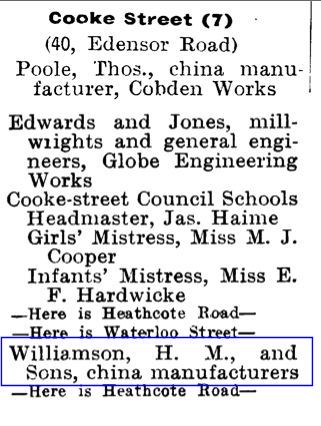
Williamson, H. M. and Sons,
china manufacturers
from..... 1907
Staffordshire Sentinel
'Business Reference Guide to The Potteries, Newcastle & District'
|
The late Mr. Williamson displayed his remarkable business abilities as a salesman as well as a manufacturer. For many years he himself conducted the business of the firm in London, and he is to-day remembered and spoken of by buyers and dealers as one of the most genial and most respected men in the trade. About twelve years ago he retired from active participation in the management of the business, but the energy he infused into every department is bearing fruit to-day. He was a member and the chairman of the old Dresden Local Board. Dresden was annexed to Longton, and he was elected a member of the Sir James’ Ward of the Longton Town Council. In 1885 he was chosen mayor, and filled the office with marked ability. His services were remembered, for in 1904 he was again elected as chief magistrate. He was exceedingly popular; his cheerful and always pleasant disposition endeared him to all who came in contact with him, both in public and private life. He was elected an alderman, and having found it desirable, for personal reasons, to withdraw from the bench of Aldermen for a time, he again sought re-election, and on the first vacancy occurring on the aldermanic bench, Mr. Williamson was again elected to fill it : an experience as gratifying as it was unusual. He was a County Councillor from its first origin, up to last year. He was a most useful committee-man, serving on several committees, and being chairman of one. He was a member of the Board of Guardians for Stoke for sixteen years, and chairman of the board for five years, retiring last year : chairman of the Sick Nursing Association, a trustee of the Cottage Hospital, and treasurer and trustee of the Aynsley Dole to the aged poor of Longton. He was the oldest but one on the Commission of the Peace for the borough. He was an active worker in connection with the Methodist Church, and was for a long time superintendent of the Sunday School. The funeral took place at the Borough Cemetery on August 3, in the presence of a large concourse of relatives and friends, and representatives of many public bodies. Though a busy and keen man of business, the late Mr. Williamson was always solicitous for the welfare of the poor amongst whom he lived. He leaves a widow, three sons and two daughters, to whom we offer our sympathies Pottery Gazette, Sept 2, 1907, pp 1058,9 |
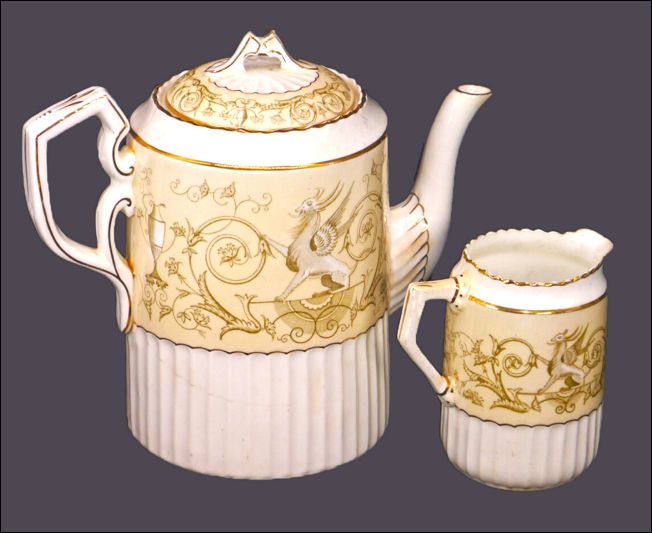 a teapot and milk jug in the griffin pattern the design incorporates bands of fluting at the base with angular ear shaped handles, the hollow ware has a slightly tapering cylindrical form |
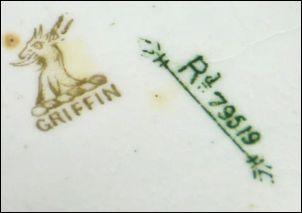 GRIFFIN is the pattern/design name - there is no manufacturers name but the registration number 79519 shows that the design was registered on the 25th August 1887 by H. M. Williamson & Sons of the Bridge Pottery, Longton |
|
the name "Anglo Delft" has no specialised meaning - it was a made-up name giving a supposed connection to Delft Ware Keeling & Co produced a different pattern which they also called Anglo Delft - there was no connection between the two companies |
c. 1879-1903
|
photos courtesy: Geraldine Tapping
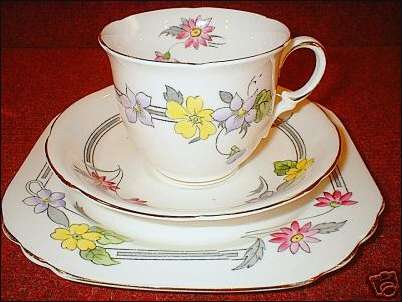
trio of cup, saucer and
plate by H M Williamson & Sons,
in the Woodside pattern
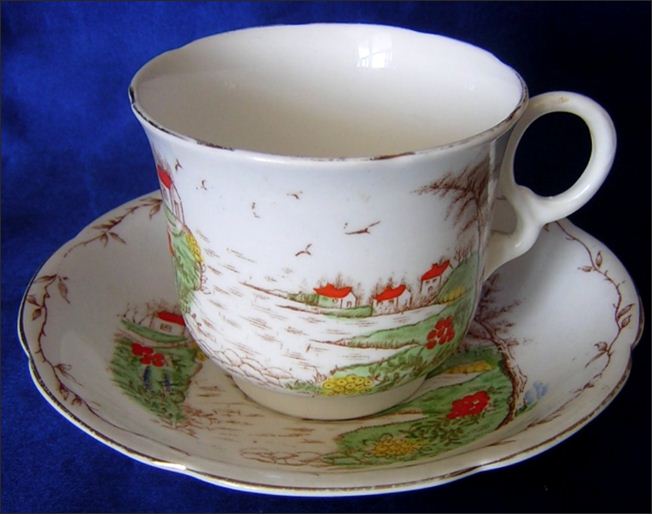 cup & saucer with hand coloured cottages around a village pond |
 English Best Bone China mark of a globe with an angel holding a pennant with the St. George's Cross |
the mark is almost certainly
that of H. M. Williamson & Sons
a similar mark is listed in a trade directory entry
for them
photos courtesy: Janet Carlo
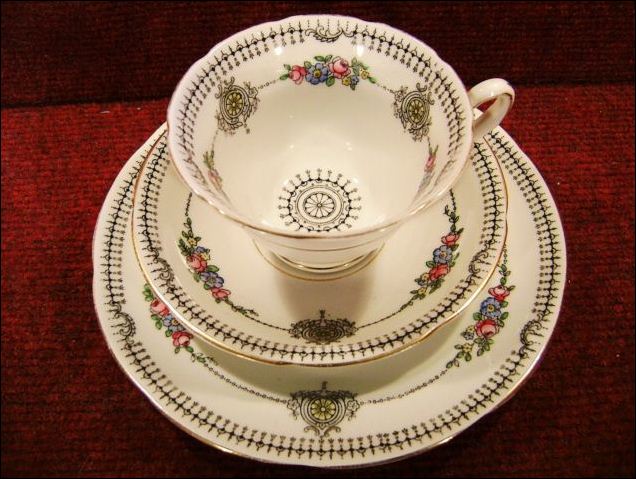
trio in the Granville pattern
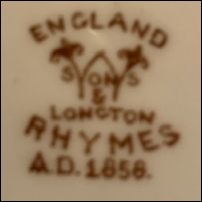
England
W & Sons
Longton
RHYMES
A.D. 1858
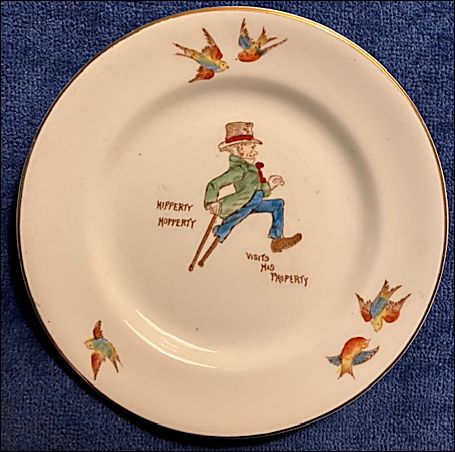 Hipperty Hopperty visits his Property photo courtesy: Mary Lee Lockhart |
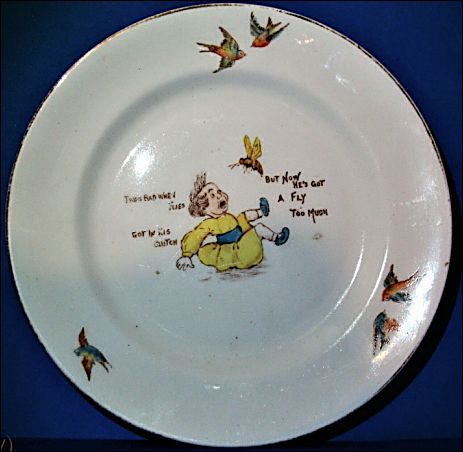 Twas Bad When Flies Got in His Clutch But Now He's Got A Fly Too Much |
In common with a number of
pottery manufacturers H M Williamson produced a wide
range of children's ware, often with well know nursery-rhymes and
characters
these two plates from the RHYMES series feature generally unknown characters
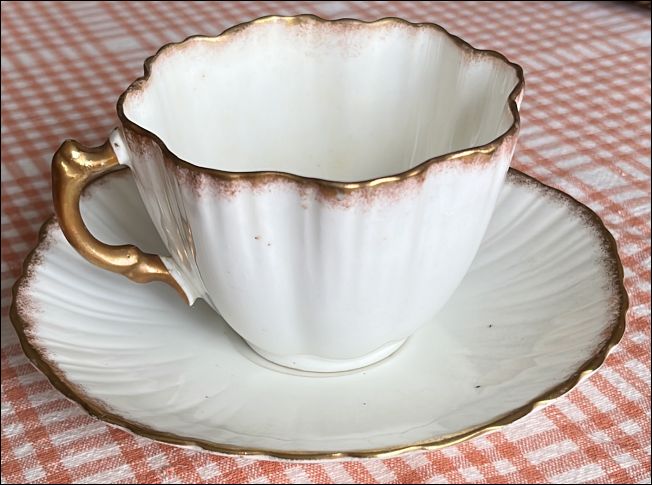 bone china cup & saucer in a fluted design
|
impressed mark |
photos courtesy: Camille Polkownik
Novem Artem China
For years past they have been bringing out a long succession of registered designs. Buyers are thus accustomed always to expect something new from Messrs. Williamson when visiting Mr. Brock’s showrooms. This season there is an interesting novelty for them, in which the firm fully maintain the individuality which has always pertained to their wares, both in shape and ornamentation. To keep in touch with the present demand for art in the home, the firm have just placed on the market an original application of "New Art" to porcelain, which they call their "Novem Artem." The principle which has guided them in this novelty is that decorative patterns should not be applied to articles of utility — particularly pottery — without a due regard to the form of the piece, the material of which it is made, and the purposes for which it is used. Messrs. Williamson say that “people of taste are now rightly demanding that decoration shall be applied as a means to an end, and not as the end itself.” This is, of course, an essential of art (old or new), and the firm are doing good service by encouraging the present trend of public taste for art in connection with table ware for every-day use. The term “New Art” is general, and is applied to a great number of free and unconventional schemes of ornament. In most of them the idea is conveyed by graceful sweeps, curves, and lines. No one of them can be properly described verbally. We therefore illustrate a group of Messrs. Williamson’s table china in their "Novem Artem.”" It is supplied in several colours — the blue and the green are especially appropriate. The shades of these employed are not obtrusive, and a white china tea set will be found to harmonise with the surroundings of the average home. The Pottery Gazette, July 1, 1906 |
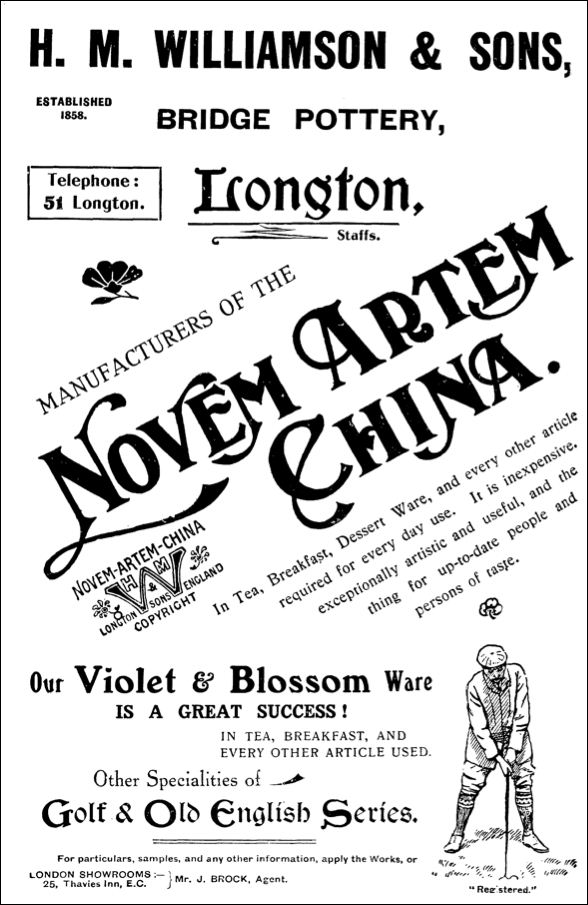
H. M. Williamson & Sons, Bridge Pottery, Longton
Established 1858
Manufacturers
of the Novem Artem China
In Tea, Breakfast, Desert Ware, and every other article
required for every day use. It is inexpensive,
exceptionally artistic and useful, and the
thing for up-to-date people and persons of taste.
Our
Violet & Blossom Ware is a Great Success!
in Tea, Breakfast, and every other article used
Other
Specialities of
Golf & Old English Series
from..... 1907
Staffordshire Sentinel
'Business Reference Guide to The Potteries, Newcastle & District'
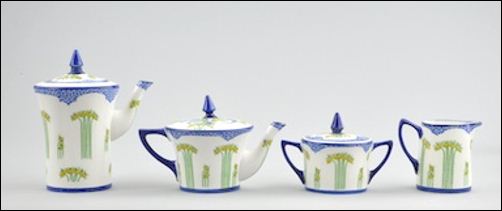
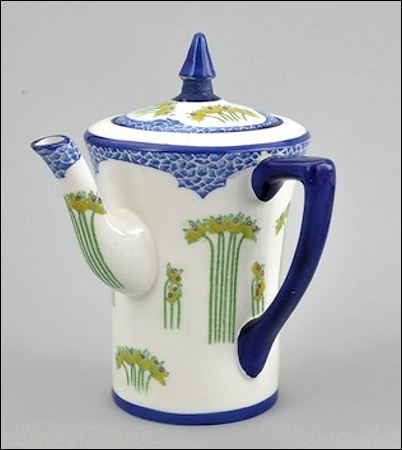
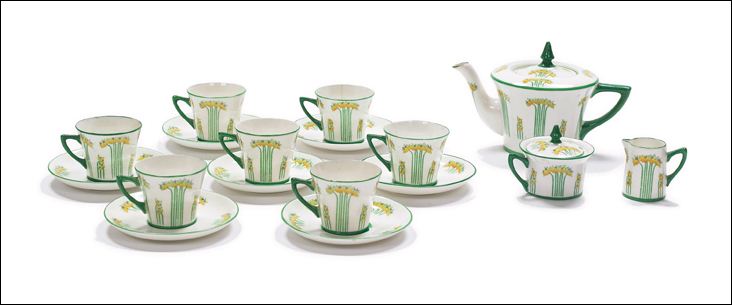
examples of H M Williamson & Sons
'NOVEM ARTEM CHINA"
Art Deco style
Suffrage tea set
|
|
 WSPU Angel of Freedom
Sylvia Pankhurst designed badges, banners and flyers for the WSPU, which were executed in the WSPU colours of purple, white and green symbolising dignity, purity and hope. The most widely used of Pankhurst’s designs was the ‘angel of freedom’ blowing a trumpet. Source: Pop up Painting - The Art of the Suffragettes (retrieved 26 Nov 2025) |
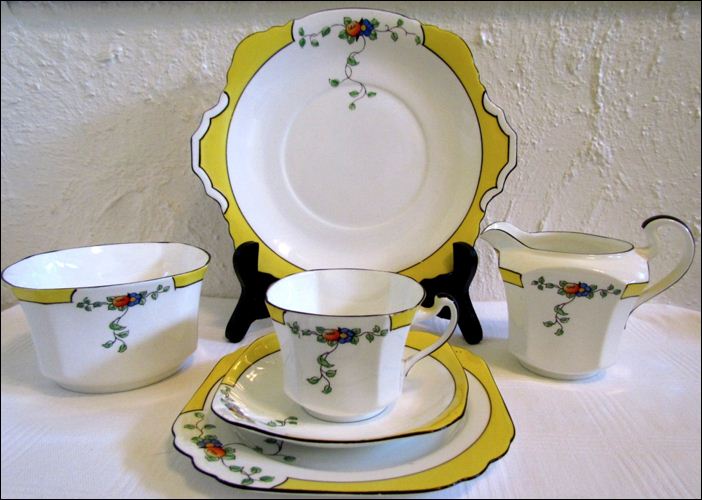
H M Williamson & Sons tea
set
bearing the Heathcote China mark from c.1928+
|
this pattern uses the same body shape as those shown above |
the registration numbers shows that this pattern was registered in 1928 |
photos courtesy: Noreen Bentley
Initials & Marks used on ware for identification:
W
&
SONS
HM
W
& SONS
WILLIAMSONS
LONGTON
Trade names:
HEATHCOTE CHINA
NOVEM ARTEM CHINA
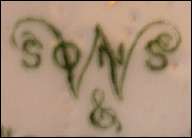 W & SONS mark used c.1903+ mark also shown in a 1947 trade directory |
mark was in use by 1907
|
Wisteria is the pattern name the registration number 496111 shows that the pattern was registered in 1907 |
|
the registration number 557909 dates from 1909 |
ASCOT is the pattern name
|
HEATHCOTE CHINA is a trade name |
|
GRECIAN is a trade name |
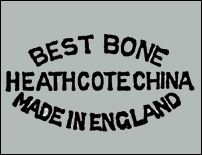 BEST BONE HEATHCOTE CHINA MADE IN ENGLAND mark used c.1928+ |
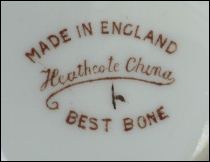 MADE IN ENGLAND HEATHCOTE CHINA BEST BONE mark used c.1928+ |
|
mark introduced c.1903 and shown in a 1947 trade directory |
 English Best Bone China this is certainly that of H. M Williamson & Sons - this mark above is likely to be an earlier version |
both of these marks show a globe with an angel (or winged man) holding a pennant with the St. George's Cross
H M Williamson's
home

Henry Mountford Williamson's
home
Cromartie House, 57 Belgrave Road, Longton
Google Street View, June 2024
Bridge Pottery Works
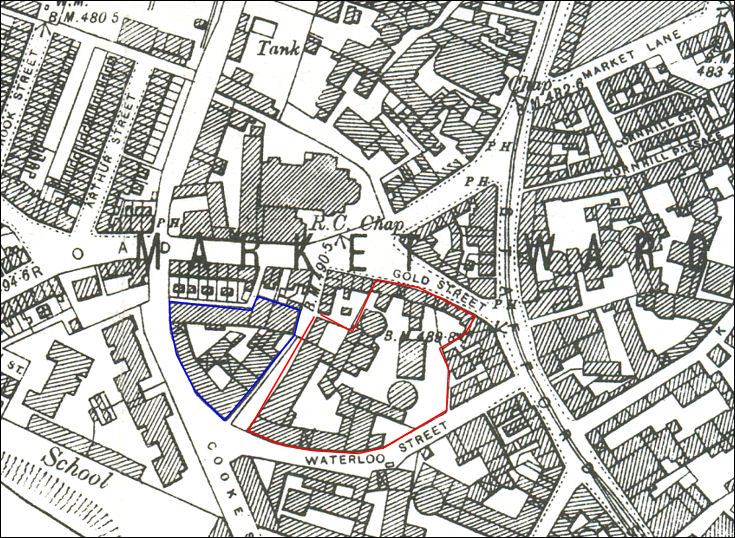
1898 map showing the top of
Heathcote Road where it joins Gold Street and Cooke Street
Williamson's works is marked in blue and the
adjacent Falcon Pottery works is marked in red
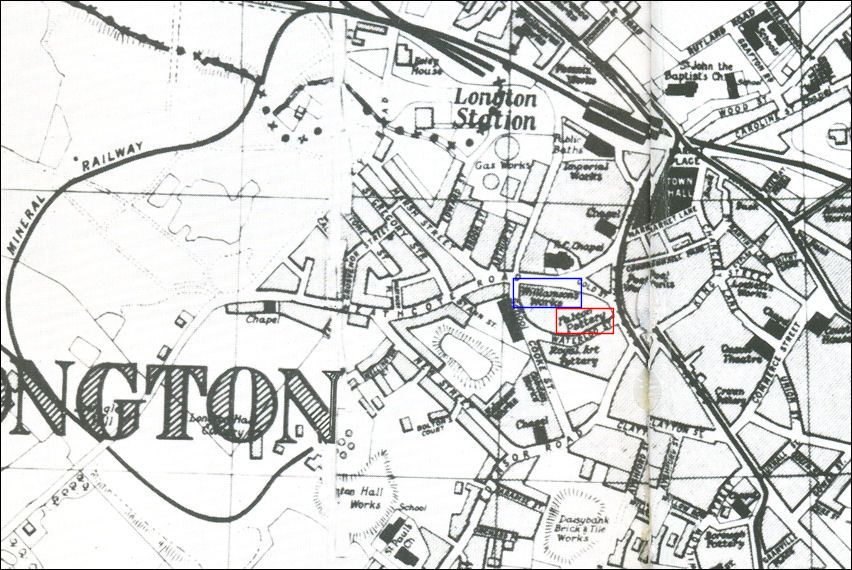
1907 trade
map showing the Williamson's works (marked
in blue)
and the adjacent Falcon Pottery works (marked
in red)
Questions, comments, contributions? email: Steve Birks
|
Page created 14 September 2021 Last updated 28 November 2025: |